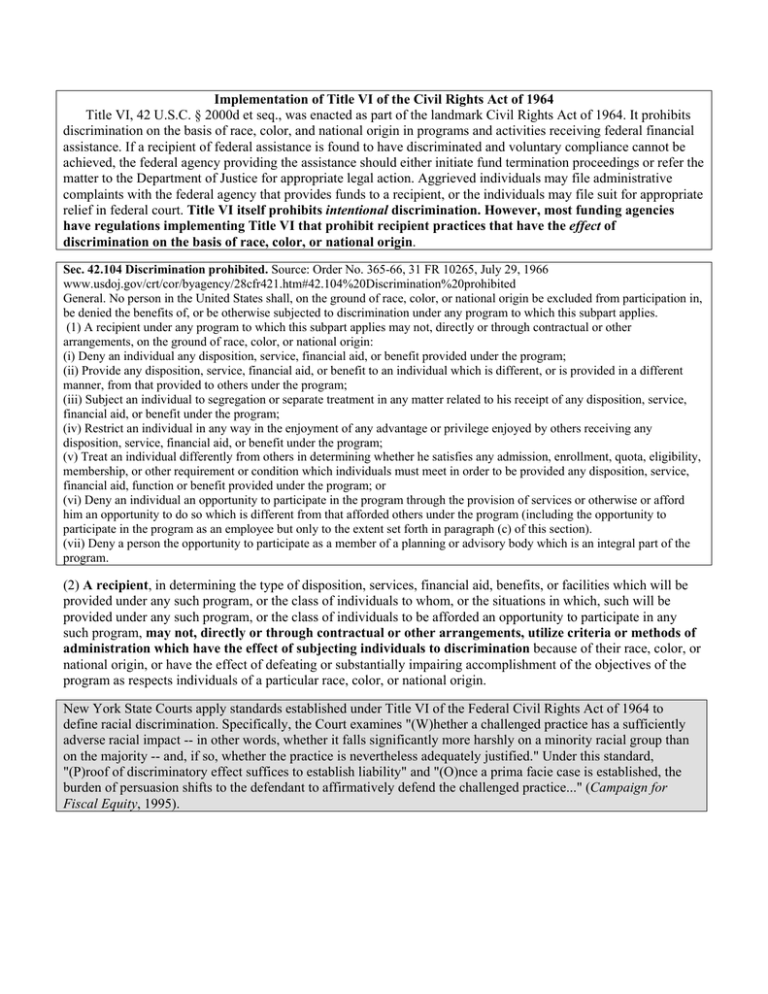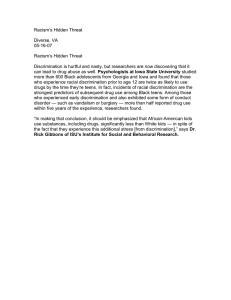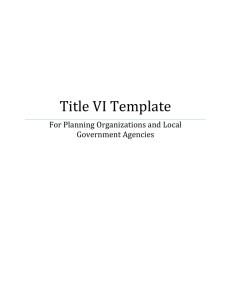Implementation of Title VI of the Civil Rights Act of...
advertisement

Implementation of Title VI of the Civil Rights Act of 1964 Title VI, 42 U.S.C. § 2000d et seq., was enacted as part of the landmark Civil Rights Act of 1964. It prohibits discrimination on the basis of race, color, and national origin in programs and activities receiving federal financial assistance. If a recipient of federal assistance is found to have discriminated and voluntary compliance cannot be achieved, the federal agency providing the assistance should either initiate fund termination proceedings or refer the matter to the Department of Justice for appropriate legal action. Aggrieved individuals may file administrative complaints with the federal agency that provides funds to a recipient, or the individuals may file suit for appropriate relief in federal court. Title VI itself prohibits intentional discrimination. However, most funding agencies have regulations implementing Title VI that prohibit recipient practices that have the effect of discrimination on the basis of race, color, or national origin. Sec. 42.104 Discrimination prohibited. Source: Order No. 365-66, 31 FR 10265, July 29, 1966 www.usdoj.gov/crt/cor/byagency/28cfr421.htm#42.104%20Discrimination%20prohibited General. No person in the United States shall, on the ground of race, color, or national origin be excluded from participation in, be denied the benefits of, or be otherwise subjected to discrimination under any program to which this subpart applies. (1) A recipient under any program to which this subpart applies may not, directly or through contractual or other arrangements, on the ground of race, color, or national origin: (i) Deny an individual any disposition, service, financial aid, or benefit provided under the program; (ii) Provide any disposition, service, financial aid, or benefit to an individual which is different, or is provided in a different manner, from that provided to others under the program; (iii) Subject an individual to segregation or separate treatment in any matter related to his receipt of any disposition, service, financial aid, or benefit under the program; (iv) Restrict an individual in any way in the enjoyment of any advantage or privilege enjoyed by others receiving any disposition, service, financial aid, or benefit under the program; (v) Treat an individual differently from others in determining whether he satisfies any admission, enrollment, quota, eligibility, membership, or other requirement or condition which individuals must meet in order to be provided any disposition, service, financial aid, function or benefit provided under the program; or (vi) Deny an individual an opportunity to participate in the program through the provision of services or otherwise or afford him an opportunity to do so which is different from that afforded others under the program (including the opportunity to participate in the program as an employee but only to the extent set forth in paragraph (c) of this section). (vii) Deny a person the opportunity to participate as a member of a planning or advisory body which is an integral part of the program. (2) A recipient, in determining the type of disposition, services, financial aid, benefits, or facilities which will be provided under any such program, or the class of individuals to whom, or the situations in which, such will be provided under any such program, or the class of individuals to be afforded an opportunity to participate in any such program, may not, directly or through contractual or other arrangements, utilize criteria or methods of administration which have the effect of subjecting individuals to discrimination because of their race, color, or national origin, or have the effect of defeating or substantially impairing accomplishment of the objectives of the program as respects individuals of a particular race, color, or national origin. New York State Courts apply standards established under Title VI of the Federal Civil Rights Act of 1964 to define racial discrimination. Specifically, the Court examines "(W)hether a challenged practice has a sufficiently adverse racial impact -- in other words, whether it falls significantly more harshly on a minority racial group than on the majority -- and, if so, whether the practice is nevertheless adequately justified." Under this standard, "(P)roof of discriminatory effect suffices to establish liability" and "(O)nce a prima facie case is established, the burden of persuasion shifts to the defendant to affirmatively defend the challenged practice..." (Campaign for Fiscal Equity, 1995).




